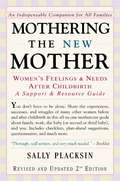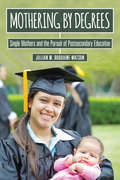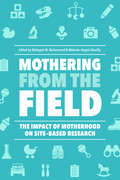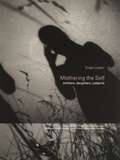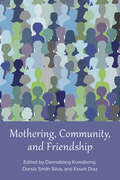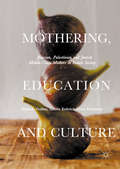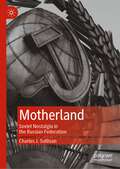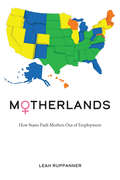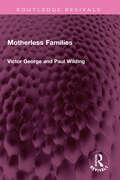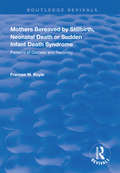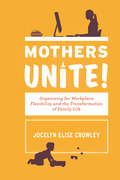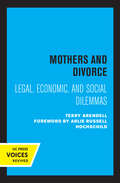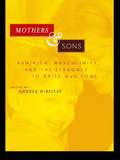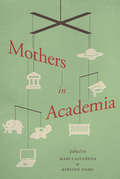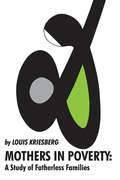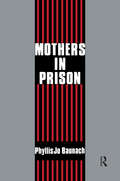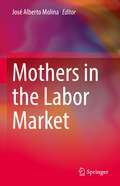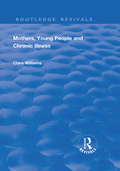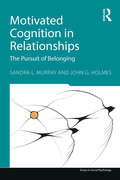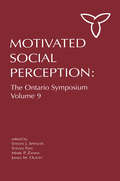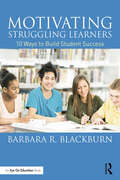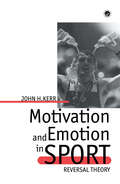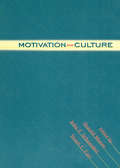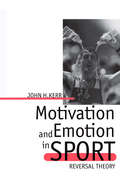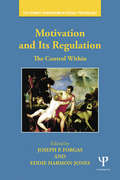- Table View
- List View
Mothering The New Mother: Women's Feelings And Needs After Childbirth - A Support And Resource Guide (Parenting Guides)
by Sally PlacksinFor the expectant and new mom, freshly updated and designed, this acclaimed all-in-one support guide focuses on all aspects of the postpartum experience. The nine chapters in this comprehensive guide include resources, networks, information, stories, and advice to nurture, validate, and empower the new mother, whether she is having her first baby or her third. Among the subjects covered are: what to expect when you go home; what is this period called "postpartum" and how long does it last; where to find breastfeeding help; how to ask for help; homecare options; what are realistic going-back-to-work options; how to relieve the isolation of at-home mothers; what to say (and not to say) to family members. Drawn from three years of research and the author's own experience, each chapter is filled with the practical suggestions and hands-on solutions provided by doctors, nurses, midwives, other caregivers, policymakers, and over 100 new mothers. Also included are many real-life stories told by women in their own voices; checklists; a prenatal and postpartum questionnaire to help assess and plan needs; reading lists; resource listings; and a separate chapter for second-, third-, or more-time moms.
Mothering by Degrees: Single Mothers and the Pursuit of Postsecondary Education
by Jillian M. Duquaine-WatsonIn Mothering by Degrees, Jillian Duquaine-Watson shows how single mothers pursuing college degrees must navigate a difficult course as they attempt to reconcile their identities as single moms, college students, and in many cases, employees. They also negotiate a balance between what they think a good mother should be, and what society is telling them, and how that affects their choices to go to college, and whether to stay in college or not. The first book length study to focus on the lives and experiences of single mothers who are college students, Mothering by Degrees points out how these women are influenced by dominant American ideologies of motherhood, and the institutional parameters of the schools they attend, and argues for increased attention to the specific ways in which the choices, challenges, and opportunities available to mothers are shaped within their specific environments, as well as the ways in which mothers help shape those environments.
Mothering from the Field: The Impact of Motherhood on Site-Based Research
by Ryanne Pilgeram Kelly Ward Cecilia Vindrola-Padros Lisa Wolf-Wendel Lindsey Alyssa Marco Stacey Camp Kelley Sams Lydia Zacher Dixon Muntaquim Muhammad Grace Karram Stephenson John M Stephenson Joanne Florence Karram Brian C Wolf Anne Hardgrove Kimberly Garland-Campbell Sarah Kelman Marylynn Steckley Deirdre Guthrie Aprille Ericsson Arielle Ericsson White Dawn Ericsson-Provine Mikae Provine Pierre EricssonThe heated national conversation about gender equality and women in the workforce is something that women in academia have been concerned with and writing about for at least a decade. Overall, the conversation has focused on identifying how women in general and mothers in particular fair in the academy as a whole, as well as offering tips on how to maximize success. Aside from a long-standing field-specific debate in anthropology, rare are the volumes focusing on the particulars of motherhood’s impacts on how scientific research is conducted, particularly when it comes to field research. Mothering from the Field offers both a mosaic of perspectives from current women scientists’ experiences of conducting field research across a variety of sub-disciplines while raising children, and an analytical framework to understand how we can redefine methodological and theoretical contributions based on mothers’ experiences in order not just to promote healthier, more inclusive, nurturing, and supportive environments in physical, life, and social sciences, but also to revolutionize how we conceptualize research.
Mothering the Self: Mothers, Daughters, Subjects (Transformations)
by Stephanie LawlerThe mother-daughter relationship has preoccupied feminist writers for decades, but typically it has been the daughter's story at centre-stage. Mothering the Self brings together these maternal and daughterly stories by drawing on in-depth interviews with women who speak both as mothers and as daughters. This study examines the ways in which these mothers and daughters participate in their understanding of class, gender, and race locations, both using and resisting them. The result is a fresh start from which to consider the far-reaching implications of this relationship - not simply for mothers and daughters, but in terms of how we understand the shaping of the self and its place within the social world.
Mothering, Community, and Friendship
by Dannabang Kuwabong;Dorsía Smith Silva;Essah DiazMothers, Community, and Friendship is an anthology that explores the complexities of mothering/motherhood, communities, and friendship from across interdisciplinary and multidisciplinary perspectives. The chapters in this text not only examine how communities and friendship shape and influence the various spectrums of motherhood, but also analyze how communities and friendship are necessary for mothers. Through personal, reflective, critical essays, and ethnographies, this collection situates the ways mothers are connected to communities and how these relationships forms, such as in mothering groups and maternal friendships. By calling attention to these central and current topics, Mothers, Community, and Friendship represents how communities and friendship become means of empowerment for mothers.
Mothering, Education and Culture
by Sveta Roberman Deborah Golden Lauren ErdreichThis book is an ethnographically-informed interview study of the ways in which middle-class mothers from three Israeli social-cultural groups - immigrants from the former Soviet Union, Palestinian Israelis and Jewish native-born Israelis - share and differ in their understandings of a 'proper' education for their children and of their role in ensuring this. The book highlights the importance of education in contemporary society, and argues that mothers' modes of engagement in their children's education are formed at the junction of class, culture and social positioning. It examines how cultural models such as intensive mothering, parental anxiety, individualism, and 'concerted cultivation' play out in the lives of these mothers and their children, shaping different ways of participating in the middle class. The book will be of interest to anthropologists and sociologists studying mothering, education, parenting, gender, class and culture, to readers curious about daily life in Israel, and to professionals working with families in a multicultural context.
Motherland: Soviet Nostalgia in the Russian Federation
by Charles J. SullivanThis book explores the extent to which and the reasons why Russia’s citizens harbor feelings of nostalgia for the Soviet Union today. Based on the results of a nationwide survey and rigorous field research carried out within several of Russia’s regions, Dr. Sullivan uncovers material and cultural rationales for this sentiment of nostalgia – which poses both an opportunity and a challenge to the Russian government. With Russian nationalism and revanchism a resurgent force in contemporary global affairs, this detailed study will interest scholars of international relations and of populist authoritarianism around the world.
Motherlands: How States Push Mothers Out of Employment
by Leah RuppannerIn the absence of federal legislation, each state in the United States has its own policies regarding family leave, job protection for women and childcare. No wonder working mothers encounter such a significant disparity when it comes to childcare resources in America! Whereas conservative states like Nebraska offer affordable, readily available, and high quality childcare, progressive states that advocate for women’s economic and political power, like California, have expensive childcare, shorter school days, and mothers who are more likely to work part-time or drop out of the labor market altogether to be available for their children. In Motherlands, Leah Ruppanner cogently argues that states should look to each other to fill their policy voids. She provides suggestions and solutions for policy makers interested in supporting working families. Whether a woman lives in a state with stronger childcare or gender empowerment regimes, at stake is mothers’ financial dependence on their partners. Ruppanner advocates for reducing the institutional barriers mothers face when re-entering the workforce. As a result, women would have greater autonomy in making employment decisions following childbirth.
Motherless Families (Routledge Revivals)
by Victor George Profesor Paul WildingFirst published in 1972, Motherless Families shows how, with the slow disappearance of the extended family and the support that it could offer in such situations, society has found itself responsible for lone-parent families. The authors cover the situation of about six hundred families in the East Midlands where the father was caring for his children on his own. They examine the father’s feelings about his new circumstances, the problems he faces and how he copes with them. They look at the ways in which the social services, the modified extended family and the immediate community react to the father’s position. They also consider the children’s adaptation to the motherless situation and their new relationships with the father or a mother substitute. In the final chapter the authors examine the ways in which social class and social values affect the definitions of social problems and the formulation of social policy. Both administrators and practitioners in the social services, as well as students of related subjects, will welcome the research contained in this book, and will find the authors’ conclusions of particular help in their approach to the problems of all types of one-parent families.
Mothers Bereaved by Stillbirth, Neonatal Death or Sudden Infant Death Syndrome: Patterns of Distress and Recovery (Routledge Revivals)
by Frances M. BoyleFirst published in 1997, this volume studied families bereaved by perinatal or infant death, including factors both preceding and following the experience and its effect on areas such as marriage, mental health and future conception, based on interviews with 194 women living in south-eastern Queensland, Australia. Tracing the natural history of the first thirty months of their loss, all mothers completed semi-structured interviews and standardized questionnaires at two, eight, fifteen and thirty months following the baby’s death. The study aims to explain and explore these effects and to suggest some potential recommendations for the care and support of women who experience stillbirth, neonatal death or SIDS.
Mothers Unite!: Organizing for Workplace Flexibility and the Transformation of Family Life
by Jocelyn Elise CrowleyIn Mothers Unite!, a bold and hopeful new rallying cry for changing the relationship between home and the workplace, Jocelyn Elise Crowley envisions a genuine, universal world of workplace flexibility that helps mothers who stay at home, those who work part time, and those who work full time balance their commitments to their jobs and their families. Achieving this goal, she argues, will require a broad-based movement that harnesses the energy of existing organizations of mothers that already support workplace flexibility in their own ways.Crowley examines the efforts of five diverse national mothers' organizations: Mocha Moms, which aims to assist mothers of color; Mothers of Preschoolers (MOPS), which stresses the promotion of Christian values; Mothers & More, which emphasizes support for those moving in and out of the paid workforce; MomsRising, which focuses on online political advocacy; and the National Association of Mothers' Centers (NAMC), which highlights community-based networking. After providing an engaging and detailed account of the history, membership profiles, strategies, and successes of each of these organizations, Crowley suggests actions that will allow greater workplace flexibility to become a viable reality and points to many opportunities to promote intergroup mobilization and unite mothers once and for all.
Mothers and Divorce: Legal, Economic, and Social Dilemmas
by Terry ArendellThis title is part of UC Press's Voices Revived program, which commemorates University of California Press’s mission to seek out and cultivate the brightest minds and give them voice, reach, and impact. Drawing on a backlist dating to 1893, Voices Revived makes high-quality, peer-reviewed scholarship accessible once again using print-on-demand technology. This title was originally published in 1986.
Mothers and Sons: Feminism, Masculinity, and the Struggle to Raise Our Sons
by Andrea O'ReillyFirst published in 2001. Routledge is an imprint of Taylor & Francis, an informa company.
Mothers in Academia
by Kirsten Isgro Mari CastanedaFeaturing forthright testimonials by women who are or have been mothers as undergraduates, graduate students, academic staff, administrators, and professors, Mothers in Academia intimately portrays the experiences of women at various stages of motherhood while theoretically and empirically considering the conditions of working motherhood as academic life has become more laborious. As higher learning institutions have moved toward more corporate-based models of teaching, immense structural and cultural changes have transformed women's academic lives and, by extension, their families. Hoping to push reform as well as build recognition and a sense of community, this collection offers several potential solutions for integrating female scholars more wholly into academic life. Essays also reveal the often stark differences between women's encounters with the academy and the disparities among various ranks of women working in academia. Contributors—including many women of color—call attention to tokenism, scarce valuable networks, and the persistent burden to prove academic credentials. They also explore gendered parenting within the contexts of colonialism, racism, sexism, ethnocentrism, ageism, and heterosexism.
Mothers in Poverty: A Study of Fatherless Families
by F.G. BaileyProfessor Kriesberg explores in this book the many myths about the poor, the welfare dependents, and the husbandless mothers. The evidence marshalled does not support the idea that people continue on welfare generation after generation, that the children of broken families have disrupted marriages themselves, that the poor seek out public housing and public assistance because they prefer such dependency, or that husbandless mothers all have lower educational goals for their children than do married mothers. Beginning with major theoretical issues, Kriesberg developed hypotheses about the life of the poor and culture of poverty; the hypotheses were tested with data from a study of families in public housing projects.
Mothers in Prison
by Phyllis Jo BaunachSeveral years ago, Terry Moore, a young first offender at the Florida Correctional Institution for Women, gave birth to a baby whose father was a prison guard. Mrs. Moore won the right to have her baby stay with her in prison until she was released a few months later. Although this incarcerated mother was reunited with her child shortly after giving birth, many inmate mothers are not able to be with or see their children on a regular basis during incarceration. Little is known about this significant and emotionally traumatic problem that confronts nearly two-thirds of incarcerated women.Building upon previous work, this extraordinarily insightful volume offers fresh perspective on issues which surround the separation of inmate mothers and their children, using questionnaire, standardized scales, and individual taped interviews. The author examines issues such as the impact of separation by race; the child's whereabouts at the time of the crime; the child's placement and legal custody during the mother's incarceration; inmate mothers' interest in resuming the parental role after release; child-rearing attitudes of inmate mothers; and the effects of the involvement of drugs on the mothers' relationship with their children.Through interviews with administrators, staff, and inmates, Dr. Baunach provides a detailed, descriptive analysis of the development and operations of programs to retain mother-child bonds in women's prisons in a variety of states. Dr. Baunach discusses day-long/overnight/weekend visitations, foster care placements, and similar problems of the sort that mothers in prison uniquely must face. The work also has a strong policy content, providing unique and practical recommendations for policies and programs benefiting inmate mothers and children that at the same time can be implemented within the framework of current penological practices.
Mothers in the Labor Market
by José Alberto MolinaThis book describes the social and economic issues that emerge from mothers in labor markets. It provides insight in what the quantitative effect of motherhood on the decline in mothers’ earnings is, and how things differ for mothers with lower income and lower levels of education. It also sheds light on how this effect varies for different countries and/or cultural areas, and what the impact of socio-economic policies on mothers’ labor supply is and how it changes in different family contexts. The book covers topics such as labor participation and hours of work, paid-work and home production, flexibility and work from home, self-employment and entrepreneurship, fertility and maternity leave, wage-penalty and career interruption, labor supply and childcare, gender norms and cultural issues, intra-household wage inequality and much more. This book provides an interesting read to economists, social scientists, policy makers and HR managers and all those interested in the subject.
Mothers, Young People and Chronic Illness (Routledge Revivals)
by Clare WilliamsThis title was first published in 2003: Although young people are generally very healthy, it has become clear that many of the health behaviours of young people can have serious consequences later in life. This is particularly so with the management of chronic illness, where poor management can result in serious long-term complications. This book explores how gender differentially affects both the ways in which young people manage chronic illness and the ways in which mothers care for their teenage sons and daughters. Until recently, where gender and health have been linked, the focus has typically been on women rather than men. However, there is growing interest in the health of men, with the recognition that masculinities and health interact in specific, sometimes detrimental ways. Most books examine either women’s, or less commonly, men’s health, but the comparative approach proposed reflects a growing academic and empirical trend which aims to develop new theoretical perspectives both on gender and on the relationship between gender and health. The book also challenges assumptions that gender is static, by exploring the effects of gender at a specific time of transition in the life course. The focus on adolescence is important, as it is seen by many to be the time when heterosexual values are most powerfully pursued and enforced, thus enabling interactions between gender and health to be thrown into relief. The approach adopted takes issue with many current ideas about young people, which tend to portray them as autonomous individuals, acting independently. For example, in terms of health care for young people with a chronic illness, health professionals generally adopt an individualistic approach, stressing the importance of independence for young people. Rather than seeing young people as purely autonomous, this book relocates them within families, in transition between childhood and adulthood and acting interdependently with other family members. Little is known about the complex deci
Motivated Cognition in Relationships: In Pursuit of Safety and Value (Essays in Social Psychology)
by John G. Holmes Sandra L. MurrayHow can newlyweds believe they will be together forever, while knowing that the majority of marriages end in divorce? Why do people who desperately want to be loved end up alienating those who love them? How can partners that seem like complete opposites end up blissfully happy? This volume explores such fascinating questions. Murray and Holmes outline how basic motivations to be safe from being hurt and find value and meaning control how people feel, think, and behave in close relationships. Additionally, the authors highlight how these motivations infuse romantic life through succinct and accessible descriptions of cutting-edge empirical research and vivid evolving stories of four couples confronting different challenges in their relationship. Integrating ideas from the interdependence, goals, and embodiment literatures, this book puts a provocative new spin on seminal findings from two decades of collaborative research. The book: provides a new, interdependence-based, perspective on motivated cognition in close relationships; advances a dyadic perspective that explores how motivation shapes perception and cognition in ways that result in motivation-consistent behavior; examines how "goal-driven" cognition translates a person’s wishes, desires, and preferences into judgement and behavior, and ultimately, his or her romantic partner’s relationship reality; offers a refreshing argument that the ultimate effects of motivated cognition on satisfaction and stability depend on whether the motivations which most frequently guide perception and cognition match the reality constraints imposed by the perceiver, the partner, and the characteristics of the relationship. This book is essential for social and personality psychologists and will also be valuable to clinical psychologists and clinicians who work directly with couples to effect more happy and stable relationships. Advanced undergraduate and graduate students will find it a highly engaging compendium for understanding how motivation shapes affect, cognition, and behavior in close relationships.
Motivated Social Perception: The Ontario Symposium, Volume 9 (Ontario Symposia on Personality and Social Psychology Series #Vol. 9)
by Steven Fein James M. Olson Mark P. Zanna Steven J. SpencerThis volume highlights state-of-the-art research on motivated social perception by the leaders in the field. Recently a number of researchers developed influential accounts of how motivation affects social perception. Unfortunately, this work was developed without extensive contact between the researchers, and therefore evolved into two distinct traditions. The first tradition shows that the motivation to maintain a positive self-concept and to define oneself in the social world can dramatically affect people's social perception. The second one shows that people's goals have a dramatic effect on how they see themselves and others. Motivated Social Perception shows how these two approaches often overlap and provides insights into how these two perspectives are integrated. Motivated Social Perception contains chapters on: *the effect of motivation on the activation and application of stereotypes; *self-affirmation in the evaluations of the self and others; *implicit and explicit aspects of self-esteem; *self-esteem contingencies and relational aspects of the self; *an investigation of the roots and functions of basic goals; and *extensions of self-regulatory theory. This book is intended for scholars, researchers, and advanced students interested in social perception and social cognition.
Motivating Struggling Learners: 10 Ways to Build Student Success
by Barbara R. BlackburnEvery day, teachers face the challenge of motivating struggling learners. In this must-have book, Barbara R. Blackburn, author of the bestseller Rigor Is Not a Four-Letter Word, shares how you can finally solve this problem and make your classroom a rigorous place where all students want to succeed. You’ll learn practical strategies for... understanding extrinsic and intrinsic motivation; building a trusting relationship with students; using praise and positive feedback effectively; empowering students and helping them own their learning; moving students toward a growth mindset; communicating high expectations for students; engaging all students in your lessons; scaffolding so all students will want to improve; helping students be resilient and not fear failure; and celebrating diverse groups of students. Each chapter is filled with a variety of examples and tools that you can use immediately. Bonus: Many of the tools are also available as free eResources on our website, www.routledge.com/9781138792432, so you can easily download and print them for classroom use.
Motivation And Emotion In Spor: Reversal Theory
by John H KerrFirst Published in 2004. Routledge is an imprint of Taylor & Francis, an informa company.
Motivation and Culture
by Stuart C. Carr Donald Munro John F. SchumakerAlthough a growing number of researchers emphasize the social and psychocultural aspects of motivation and motivation theory, few books have provided much coverage beyond well-tread studies of physiological and biological factors and theories. Motivation and Culture brings together eighteen writers with a variety of academic backgrounds and cultural experiences to explore the way that culture impinges on motivation. Exploring topics such as personal values and motives, intercultural exchange in the workplace, the intrapsychic process and the nexus between biology and culture, they formulate theories of motivation that can be applied in the modern multicultural world. Contributors include: Dona Lee Davis, Russell Geen, Joan Miller, John Paul Scott, William Wedenoja, Elisa J. Sobo and Stephen Wilson.
Motivation and Emotion in Sport: Reversal Theory
by John H. KerrWhy did Michael Jordan quit basketball and take up baseball? Why was Martina Navratilova so successful as a professional tennis player? These and many other questions about aspects of motivation and emotion in sport are addressed in this book which is newly available in paperback. Reversal theory's systematic conceptual framework allows a unique perspective for interpreting behaviour in sport contexts. Within each chapter, real-life examples are combined with research findings to provide an understanding of the emotional background and changes which accompany the individual's unique experience in sport. In addition, suggestions as to alications of reversal theory in new areas of sport psychology and the future direction of reversal theory-based sport research are outlined. For those interested in a truly insightful understanding of human behaviour in sport, this book will be required reading.
Motivation and Its Regulation: The Control Within (Sydney Symposium of Social Psychology)
by Eddie Harmon-Jones Joseph P. ForgasIt is motivation that drives all our daily endeavors, and it is motivation, or the lack of it, that accounts for most of our successes and failures. Motivation, however, needs to be carefully controlled and regulated to be effective. This book surveys the most recent psychological research on how motivational processes are regulated in daily life to achieve desired outcomes. Contributors are all leading international investigators, and they explore such exciting questions as: What is the relationship between motivation and self-control? What is the role of affect and cognition in regulating motivation? How do conscious and unconscious motivational processes interact? What role do physiological processes play in controlling motivation? How can we regulate aggressive impulses? How do affective states control motivation? Can motivation distort perception and attention? What are the social, cultural and interpersonal effects of motivational control? Understanding human motivation is not only of theoretical interest, but is also fundamental to applied fields such as clinical, counseling, educational, organizational, marketing and industrial psychology. The book is also suitable as an advanced textbook in courses in motivational sciences, and is recommended to students, teachers, researchers and applied professionals as well as laypersons interested in the psychology of human motivation and self-control.
